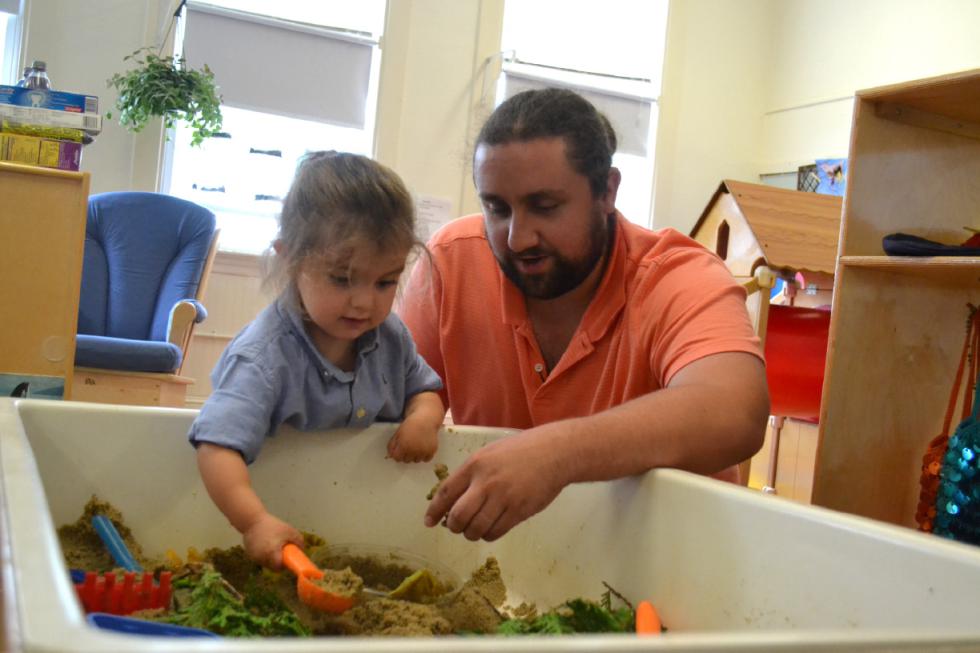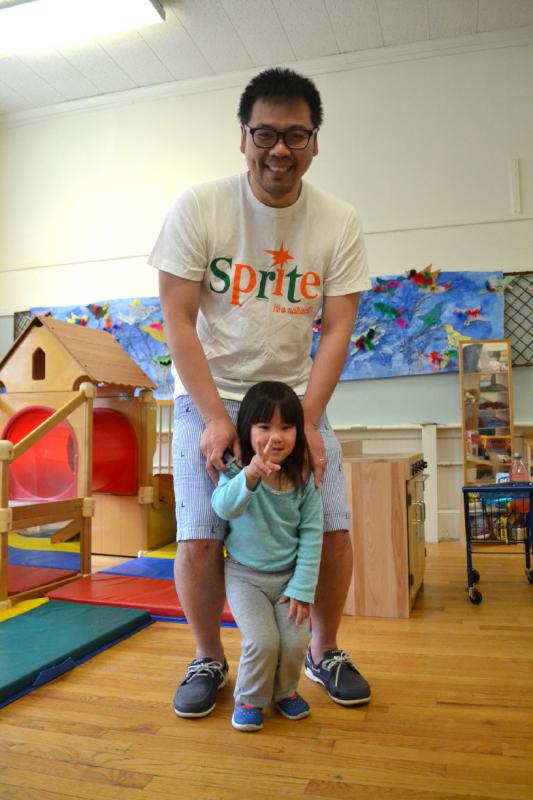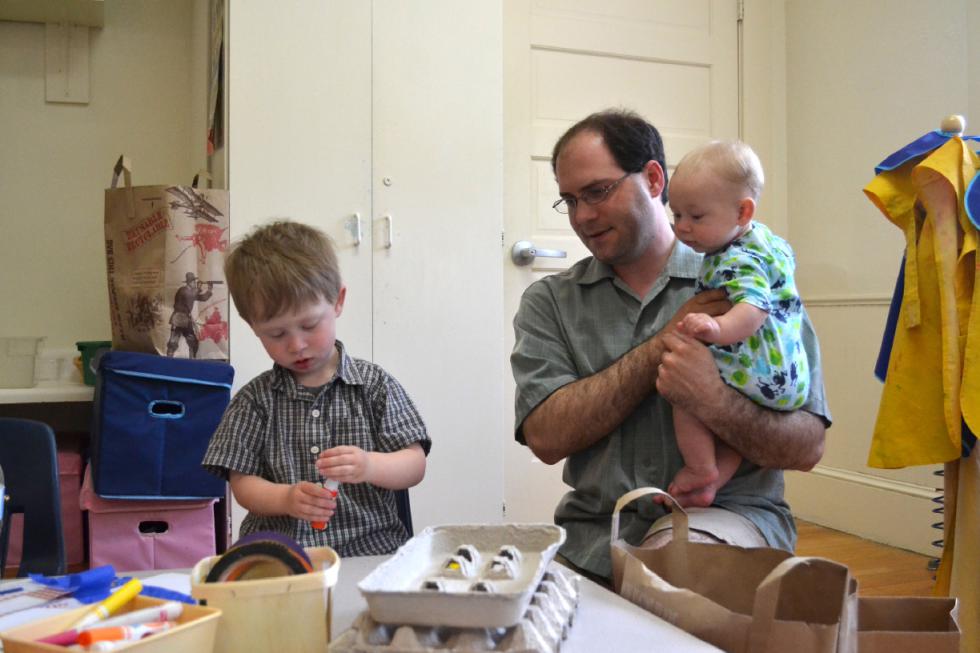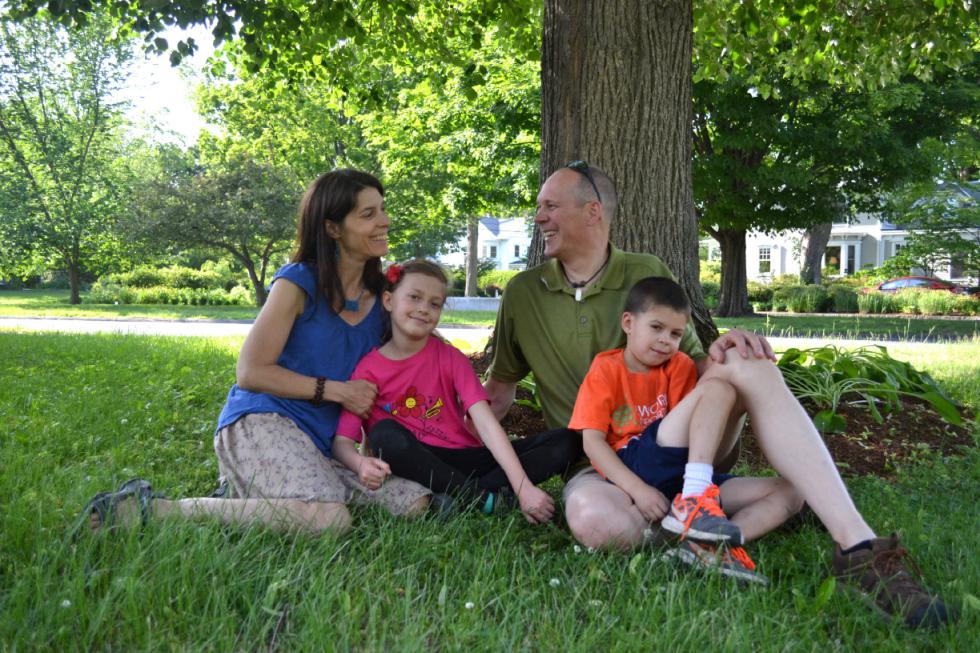“I always knew that I wanted to be a dad,” Joey Mella tells me. “Then I got married and we had three children very quickly. Now I’m kind of maxed out.”
The middle child, two-year-old Ati Mella-Reiss, pushes a miniature shopping cart across the wood floor of the playroom at the Amherst Family Center on North Pleasant Street. He steers his goods over to the corner of the room where we are standing, and the cart bumps up against his father’s leg.
“Whatcha got there?” Mella asks. He takes a look at his son’s selections from the playroom’s imitation grocery store: a bag of Goya dried black beans, a sports bottle filled with glittery pink water, and a tube of toothpaste. “Nice shopping, bud.”
Ati rolls away. Mella turns back to me. “I’m 30 now, and I still don’t really feel like a dad. Or at least, what I thought being a dad would feel like. I feel really young. It’s a little shocking sometimes to think that this all just happened.”
Mella is a server at The Farm Table restaurant in Bernardston. He’s casually dressed, and his hair, like Ati’s, is pulled back in a ponytail. He’s got the energy of a busy parent — slightly manic fatigue, but also a sense of calm.
That feeling of dissonance he describes — his former life upended by the demands of children — is hardly exclusive to dads.
Over the past few decades, much has changed in how fathers think of their roles as providers, family members, and caregivers. According to a 2014 White House report called “Nine Facts about American Families and Work,” rising earnings for women make up most of the growth in family incomes over the past 50 years, with more than 40 percent of mothers now the sole or primary source of household income. Over the past 25 years, the number of households with a stay-at-home dad and a working mom doubled.
Increasingly, men are taking on more child care responsibilities. But the social expectations of a dad’s role can take years — sometimes generations — to shift.
In the meantime, many of today’s dads are trying to forge a new, more involved standard for fatherhood.
Mella says his wife Laila Reiss, who works from home, is with the kids more often than he is. “At least in our family, the dynamic is that they’re more attached to her than to me,” he says.
“I thought that being a father was going to feel like being a king, you know? The guy who rules the house. But there’s nothing macho about being a dad. The amount of sacrifice my wife gives — I can’t even get close to that. But I try. You may not feel ready to be a dad, but doing it makes you ready.”
John and Lori Engel both lost their jobs five years ago, at the tail end of the Great Recession. He was laid off from his job in Boulder when the housing market crashed, and she found herself unemployed soon after. They had no family in Colorado. With their toddler daughter Zoe in tow, and Lori pregnant with their second child, Adam, they moved to Northampton in 2009.
The family’s new walk to the Northampton Parents Center, at Edwards Church on Main Street, was quick and easy, and for the next few years John Engel visited several times a week. He remembers feeling relieved to connect with other parents, asking practical questions and airing concerns.
“It was like Cheers,” he says. “You want to go to a place where everyone knows your name. You don’t always have the brain capacity for in-depth conversations. But to talk with other dads and moms really normalized the experience for me. When you’re home with young kids, the isolation can be maddening, so even fragmented talks with other parents was worth a lot.”
Before having children, John and Lori Engel were living an outdoor Rockies lifestyle: backpacking, rock climbing, skiing, and daily bike rides to work. They had little daily exposure to young children, he says, which made parenthood “a completely new, amazing, totally overwhelming experience.”
Now he works as a coordinator for the Healthy Men and Boys Network of Western Massachusetts, and he writes regularly about family life on his website, FatherhoodJourney.com. When his daughter was born, he committed to spending several days a week at home. He says he didn’t want to be a dad who came home at six in the evening and pinch-hit until the kids were asleep. So when Zoe was an infant, each week he spent several 10-hour days with her.
“I felt completely broken and shattered by it, in a really positive way,” he says. “I had to let go of a lot of beliefs about myself and how I wanted to spend my time.”
In the years since then, the Engel family has learned a few lessons. Get the kids outside as much as possible, but scale every activity to your kids’ level of endurance. Establish yearly rituals that encourage reflection, like art projects at Thanksgiving to illustrate things for which the family is grateful. And in a world of increasingly busy children’s schedules, remember to frequently say no to new activities. In Engel’s words: “Do a little less than you could, and it ends up being more in the end.”
Do fathers need to push against cultural norms in order to actively engage with their kids? Engel’s organizing work with the Healthy Men and Boys Network leads him to say yes. That dynamic looks different from one household to another, but good parity in parental duties looks similar across race, class, and geography.
“Strong traditional gender roles and stereotypes make for an unequal balance; where anything I attempt to do bumps up against the so-called mother’s domain,” he says. “That puts pressure on my wife to figure everything out, and it puts pressure on me not to challenge her authority. But when you do a good job at promoting gender equality, both in and outside of the home, you start to create the conditions for better parenting.”
Holyoke resident Roy Lichtenstein has faith in that ideal. But getting there, he says, is easier said than done. Every year for the past 18 years, he and other staff members at the Main Street community nonprofit Enlace de Familias take walks through Holyoke, block by block, to talk with young men in schools, in barbershops, and on basketball courts about the challenges they face as fathers.
“A lot of systems aren’t set up for dads, and there’s still a big stigma among some men about active fathers, assuming that they shouldn’t get too involved in their children’s lives,” he says. “That’s why we went out into the community here to talk to fathers, to see what their needs are.”
Lichtenstein is now a trainer and the lead organizer for Nurturing Fathers, a 13-week program in Holyoke that helps dads, brothers, grandfathers — anyone caring for a child — develop nurturing skills and communication tools.
“We’re not trying to discount mothers’ involvement,” he says. “But there’s a gap here we’re trying to fill.
“A lot of us didn’t have fathers involved in our lives growing up,” he adds. “So a lot of guys have ideas of what it means to be a dad that are off-base. Work to feed your family. Be strong. Man up. Don’t be the weak link. Do what you got to do. Well, okay, but there’s more to it than that. If you’re not nurturing, you actually are making yourself the weak link.”
Nurturing Fathers pulls in about 25 participants at a time through outreach as well as collaboration with the Department of Children and Families and agencies like Head Start and Square One. The program, which was created by educator Mark Perlman in the 1980s, is broken into weekly lessons beginning with “The Roots of Fathering,” in which participants speak freely about their own parents. Later lessons — communicating with your partner, balancing work, playing with children, disciplining without violence — prompt further discussion.
“A lot of families don’t realize that they teach what they learned themselves as kids, and that it’s easy to do damage by repeating past mistakes,” Lichtenstein says. “Not just fathers, but men in general. We have been taught things that are outdated. Things we never really agreed upon. Things we didn’t set up ourselves. No one’s off the hook on making that better.”
And growing into the role of dad takes time, whether you’re in a program like Lichtenstein’s or not.
“So many dads say, ‘I love my kids, no matter what,’ ” he says. “Well, do you really mean that? Do you understand what it means when you say that? A lot of guys have some serious emotional issues to work through. You can’t take care of somebody else until you take care of yourself.”
Three weeks ago Rob Okun attended a co-ed baby shower in North Carolina. The place was crawling with fathers.
“They were wearing their babies in those child holders,” he tells me. “They were changing them in the bathroom. They were supervising the play. This is really different from how things used to be.”
Okun, 64, has four children and two grandchildren, with a third due in July. He is also the editor and publisher of Voice Male Magazine, a pro-feminist magazine about gender and family issues that grew out of his longtime involvement with the Men’s Resource Center in Amherst.
To his eye, more and more fathers are making the conscious decision to slow down their careers, and possibly earn a little less, in order to get more involved in their children’s lives.
Back in the 1980s, Okun remembers, pop culture depicted dads mostly as bumbling idiots or as absentees, which didn’t do much to advance the cause. “You know the experience a woman has sometimes in a hardware store, when she asks for a hammer and the clerk turns and responds to her husband instead? That’s how I often felt back then, when I participated in conversations about my kids.”
Cultural assumptions about fatherhood change slowly but steadily, and in unexpected ways. For example, Okun admires President Obama’s decision to set up a swing-set outside the Oval Office window, calling it “an important symbol.” Even small changes to public spaces, like the gradual addition of baby changing tables to men’s rooms, signal an acknowledgement that dads are frequently out with their children.
Okun describes his own western Massachusetts childhood as “very traditional, ’50s-style.” His mother was much more hands-on with the kids than his father. But his father was sensitive, gentle, and home often. “I was able to get a well-rounded view of him,” he says. “He didn’t explicitly share his feelings very often, but his confidence and kindness really had an impact on me.”
Fathers’ conversations with their partners are, naturally, just as important as their talks with their kids. Okun’s most pressing bit of advice for new and expecting parents is to have not one, but ongoing talks about sharing responsibility.
“You need to be able to express your vulnerability and inexperience to each other,” he says. “And that goes both ways. Some women will say, ‘I’m really happy that my husband wants to be so involved, but goddamn it, this was always the mom’s domain, and here come the guys trying to take over.’ Some people enjoy that more old-school set-up, where the man goes off with his briefcase and lunch box and only comes home at the end of the day. That’s fine too, but you don’t want to fall back on those positions without really talking it through.”
Also, he says, don’t forget about the grandparents. Two years ago, one of Okun’s daughters became a mother while in nursing school, and he flew to New Orleans and spent eight days with the seven-month-old while his daughter worked long shifts and clinical rotations.
“All of those feelings of nurture and care that a new parent feels? They’re just as fresh 30 years later,” he says. “I would have to stop and remind myself at moments that I’m not in first position anymore — I’m support. But once you’ve done it, you just never forget it.”
At the Amherst Family Center, two-year-old Ati Mella-Reiss is pushing his shopping cart around, searching for new groceries to add to his full haul. He nearly bumps up against Fifi Chang, who is also two years old. She runs to grab the leg of her father, Chun Chih Chang, 33.
“She’s shy, but she’s getting better,” he says. “She’s always watching people, observing.” Chang and his wife Yuhsuan Lin have brought Fifi here since October. These days Lin is busy at home with a four-month-old son, while Chang does solo duty in the playroom with Fifi.
“I always thought I’d be a dad after I got a job, when my life was more or less stable,” says Chang, who is in his last year of grad school at UMass Amherst. He smiles. “But things happen.”
Stepping up for his daughter took some serious adjusting, he says. “I’m still studying. I don’t always have time. But my wife told me, ‘You have to be with her. You have to be patient.’ So I’ve been trying to change my attitude. I put Fifi first. I speak more softly.
“I think, previously, she was afraid when I left the house,” he adds. “But after I made that change, she seems to understand that I have to go to work, and she allows me to go.”
Fifi staggers excitedly past the snack table. There, seated on the lap of a volunteer, is six-month-old Toby Pangallo. His older brother Atticus, 2, is drawing with markers a few feet away. Their father, Matteo Pangallo, stands watching them.
“I’m always in the minority here as a father,” he says. “There will occasionally be one or two other fathers here, but they don’t come as regularly as the mothers and the grandparents.”
Pangallo and his wife Nettie live in Shutesbury. He teaches part-time at Westfield State University and does doctoral research work at UMass, but he says he is home part-time with the kids a lot while his wife teaches full days at an elementary school. They come to the Amherst Family Center often.
This is only the second time he has brought them both here without his wife. “The first time was a disaster,” he says. “Toby still needs to be bottle-fed, and we were also in the midst of potty training.”
You hear a lot about how toddlers are tyrants, Pangallo says, and it’s true. “But the flip side of that is the unconditional and spontaneous love that they give you. That’s the most rewarding thing. It makes a whole lot of work feel worth it.”
Pangallo’s life feels surreal from time to time. “I find myself playing this mental game of knowing what I’m supposed to say as the ideal parent, but then just trying to be in the moment and trust what I naturally say.” That’s called learning by doing, and he says it’s the only way to parent.
“I say this as an academic — you can read all the books, and it’s not going to get you there,” Pangallo says. “You just have to do it. That’s another thing I learned about myself. Until I had kids, my work was so pressing, and I defined myself by it. But once I had them, it’s been a simple choice. Success now is defined by what I do for these guys.”•
Contact Hunter Styles at hstyles@valleyadvocate.com








